The Interplay of Corporate Governance, Ethics, Decent Work and Growth
VerifiedAdded on 2023/06/05
|14
|3624
|60
Essay
AI Summary
This essay examines the interconnectedness of corporate governance, ethics, decent work, and economic growth, highlighting their significance in fostering sustainable development. It defines corporate governance as a system that directs and controls companies, emphasizing the importance of balancing stakeholder interests and promoting ethical behavior. The essay also delves into the concept of sustainable development, encompassing environmental, social, and economic sustainability. Furthermore, it explores the UN's goal of 'decent work and economic growth,' discussing the definition of decent work, measures of economic growth (such as GDP), and the roles of various stakeholders in achieving sustainable development goals. The essay concludes by emphasizing the importance of creating 600 million jobs globally by 2030 and addressing youth unemployment to foster a more equitable and sustainable economic future. Desklib provides access to similar essays and study resources for students.
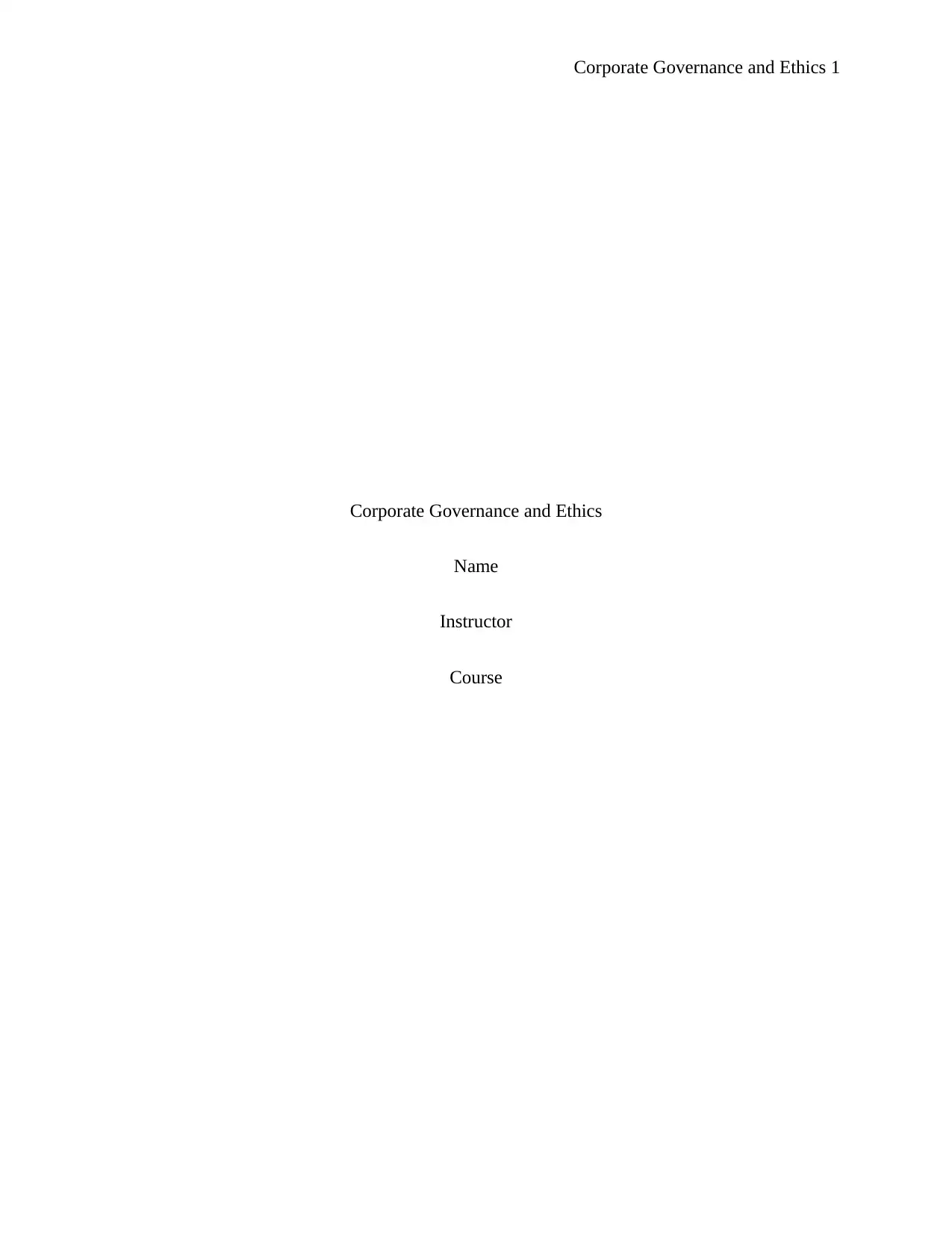
Corporate Governance and Ethics 1
Corporate Governance and Ethics
Name
Instructor
Course
Corporate Governance and Ethics
Name
Instructor
Course
Paraphrase This Document
Need a fresh take? Get an instant paraphrase of this document with our AI Paraphraser
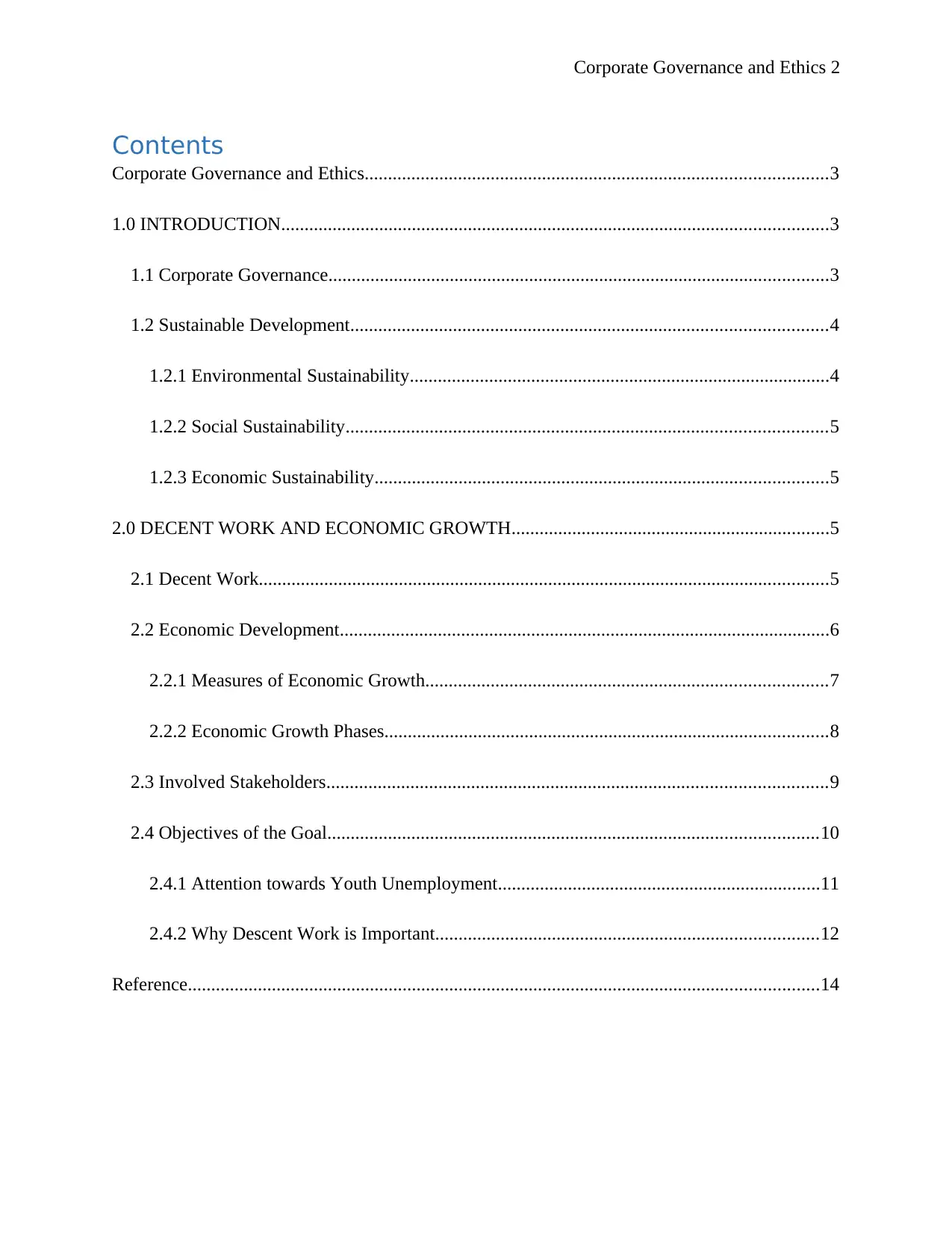
Corporate Governance and Ethics 2
Contents
Corporate Governance and Ethics...................................................................................................3
1.0 INTRODUCTION.....................................................................................................................3
1.1 Corporate Governance...........................................................................................................3
1.2 Sustainable Development......................................................................................................4
1.2.1 Environmental Sustainability..........................................................................................4
1.2.2 Social Sustainability.......................................................................................................5
1.2.3 Economic Sustainability.................................................................................................5
2.0 DECENT WORK AND ECONOMIC GROWTH....................................................................5
2.1 Decent Work..........................................................................................................................5
2.2 Economic Development.........................................................................................................6
2.2.1 Measures of Economic Growth......................................................................................7
2.2.2 Economic Growth Phases...............................................................................................8
2.3 Involved Stakeholders...........................................................................................................9
2.4 Objectives of the Goal.........................................................................................................10
2.4.1 Attention towards Youth Unemployment.....................................................................11
2.4.2 Why Descent Work is Important..................................................................................12
Reference.......................................................................................................................................14
Contents
Corporate Governance and Ethics...................................................................................................3
1.0 INTRODUCTION.....................................................................................................................3
1.1 Corporate Governance...........................................................................................................3
1.2 Sustainable Development......................................................................................................4
1.2.1 Environmental Sustainability..........................................................................................4
1.2.2 Social Sustainability.......................................................................................................5
1.2.3 Economic Sustainability.................................................................................................5
2.0 DECENT WORK AND ECONOMIC GROWTH....................................................................5
2.1 Decent Work..........................................................................................................................5
2.2 Economic Development.........................................................................................................6
2.2.1 Measures of Economic Growth......................................................................................7
2.2.2 Economic Growth Phases...............................................................................................8
2.3 Involved Stakeholders...........................................................................................................9
2.4 Objectives of the Goal.........................................................................................................10
2.4.1 Attention towards Youth Unemployment.....................................................................11
2.4.2 Why Descent Work is Important..................................................................................12
Reference.......................................................................................................................................14
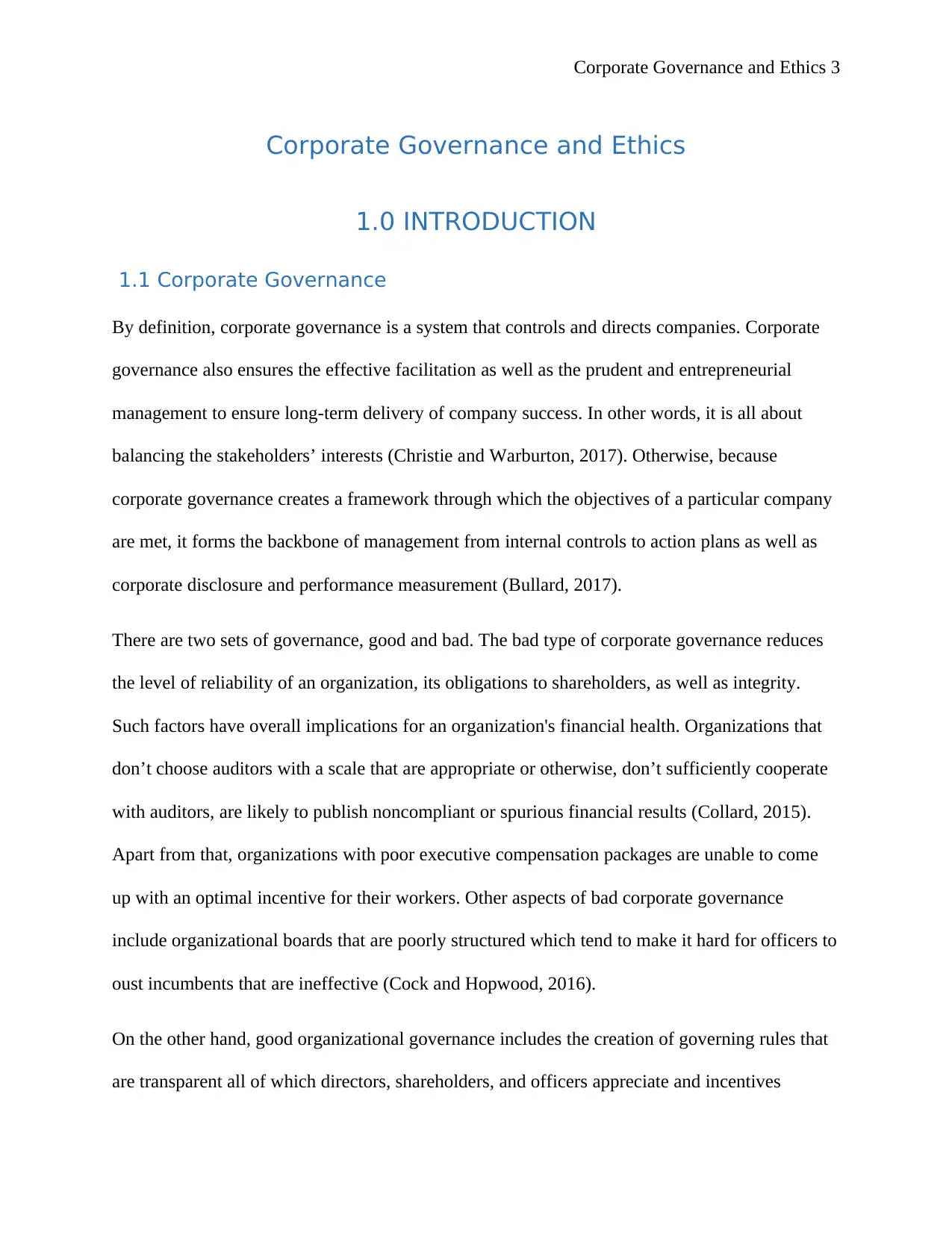
Corporate Governance and Ethics 3
Corporate Governance and Ethics
1.0 INTRODUCTION
1.1 Corporate Governance
By definition, corporate governance is a system that controls and directs companies. Corporate
governance also ensures the effective facilitation as well as the prudent and entrepreneurial
management to ensure long-term delivery of company success. In other words, it is all about
balancing the stakeholders’ interests (Christie and Warburton, 2017). Otherwise, because
corporate governance creates a framework through which the objectives of a particular company
are met, it forms the backbone of management from internal controls to action plans as well as
corporate disclosure and performance measurement (Bullard, 2017).
There are two sets of governance, good and bad. The bad type of corporate governance reduces
the level of reliability of an organization, its obligations to shareholders, as well as integrity.
Such factors have overall implications for an organization's financial health. Organizations that
don’t choose auditors with a scale that are appropriate or otherwise, don’t sufficiently cooperate
with auditors, are likely to publish noncompliant or spurious financial results (Collard, 2015).
Apart from that, organizations with poor executive compensation packages are unable to come
up with an optimal incentive for their workers. Other aspects of bad corporate governance
include organizational boards that are poorly structured which tend to make it hard for officers to
oust incumbents that are ineffective (Cock and Hopwood, 2016).
On the other hand, good organizational governance includes the creation of governing rules that
are transparent all of which directors, shareholders, and officers appreciate and incentives
Corporate Governance and Ethics
1.0 INTRODUCTION
1.1 Corporate Governance
By definition, corporate governance is a system that controls and directs companies. Corporate
governance also ensures the effective facilitation as well as the prudent and entrepreneurial
management to ensure long-term delivery of company success. In other words, it is all about
balancing the stakeholders’ interests (Christie and Warburton, 2017). Otherwise, because
corporate governance creates a framework through which the objectives of a particular company
are met, it forms the backbone of management from internal controls to action plans as well as
corporate disclosure and performance measurement (Bullard, 2017).
There are two sets of governance, good and bad. The bad type of corporate governance reduces
the level of reliability of an organization, its obligations to shareholders, as well as integrity.
Such factors have overall implications for an organization's financial health. Organizations that
don’t choose auditors with a scale that are appropriate or otherwise, don’t sufficiently cooperate
with auditors, are likely to publish noncompliant or spurious financial results (Collard, 2015).
Apart from that, organizations with poor executive compensation packages are unable to come
up with an optimal incentive for their workers. Other aspects of bad corporate governance
include organizational boards that are poorly structured which tend to make it hard for officers to
oust incumbents that are ineffective (Cock and Hopwood, 2016).
On the other hand, good organizational governance includes the creation of governing rules that
are transparent all of which directors, shareholders, and officers appreciate and incentives
⊘ This is a preview!⊘
Do you want full access?
Subscribe today to unlock all pages.

Trusted by 1+ million students worldwide
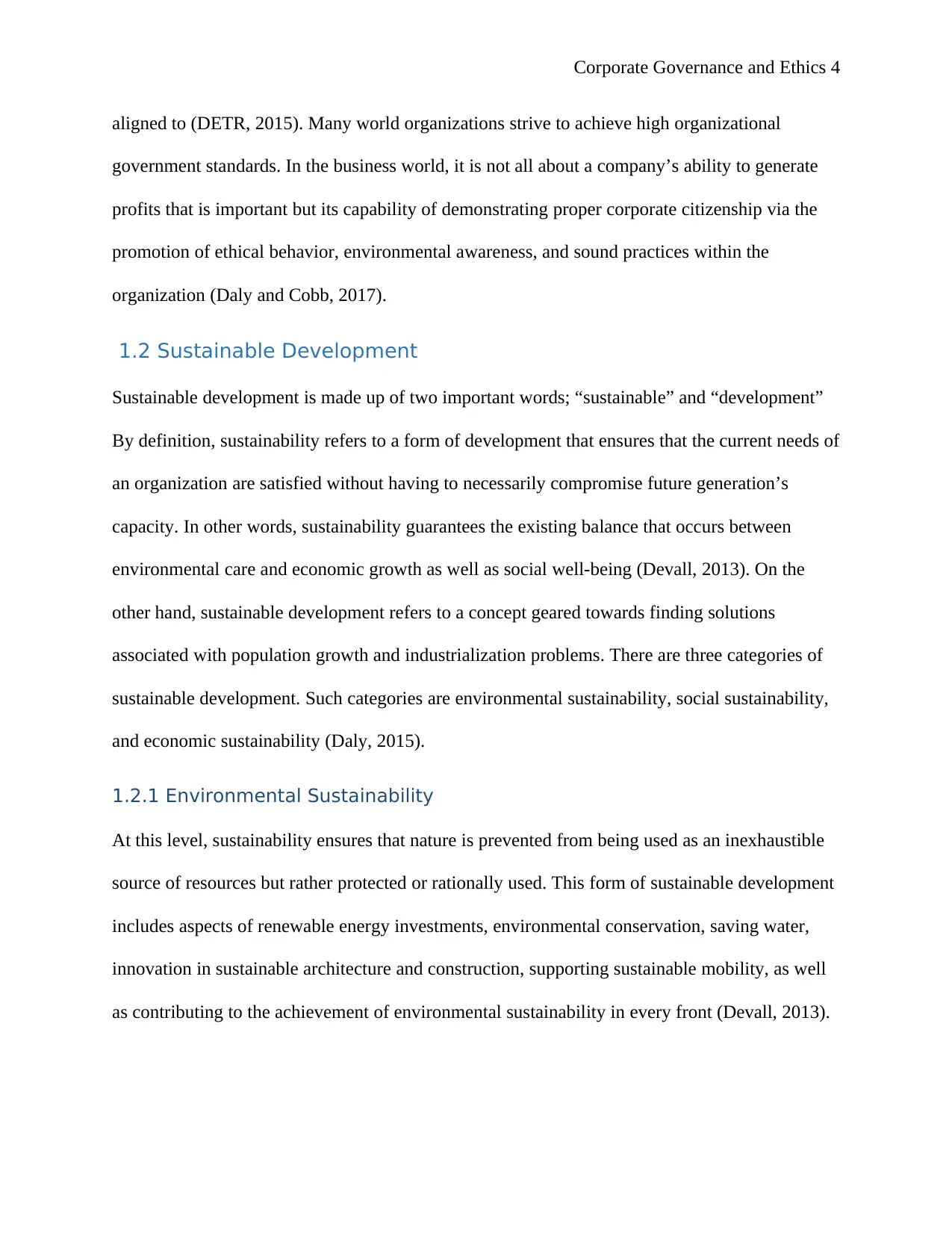
Corporate Governance and Ethics 4
aligned to (DETR, 2015). Many world organizations strive to achieve high organizational
government standards. In the business world, it is not all about a company’s ability to generate
profits that is important but its capability of demonstrating proper corporate citizenship via the
promotion of ethical behavior, environmental awareness, and sound practices within the
organization (Daly and Cobb, 2017).
1.2 Sustainable Development
Sustainable development is made up of two important words; “sustainable” and “development”
By definition, sustainability refers to a form of development that ensures that the current needs of
an organization are satisfied without having to necessarily compromise future generation’s
capacity. In other words, sustainability guarantees the existing balance that occurs between
environmental care and economic growth as well as social well-being (Devall, 2013). On the
other hand, sustainable development refers to a concept geared towards finding solutions
associated with population growth and industrialization problems. There are three categories of
sustainable development. Such categories are environmental sustainability, social sustainability,
and economic sustainability (Daly, 2015).
1.2.1 Environmental Sustainability
At this level, sustainability ensures that nature is prevented from being used as an inexhaustible
source of resources but rather protected or rationally used. This form of sustainable development
includes aspects of renewable energy investments, environmental conservation, saving water,
innovation in sustainable architecture and construction, supporting sustainable mobility, as well
as contributing to the achievement of environmental sustainability in every front (Devall, 2013).
aligned to (DETR, 2015). Many world organizations strive to achieve high organizational
government standards. In the business world, it is not all about a company’s ability to generate
profits that is important but its capability of demonstrating proper corporate citizenship via the
promotion of ethical behavior, environmental awareness, and sound practices within the
organization (Daly and Cobb, 2017).
1.2 Sustainable Development
Sustainable development is made up of two important words; “sustainable” and “development”
By definition, sustainability refers to a form of development that ensures that the current needs of
an organization are satisfied without having to necessarily compromise future generation’s
capacity. In other words, sustainability guarantees the existing balance that occurs between
environmental care and economic growth as well as social well-being (Devall, 2013). On the
other hand, sustainable development refers to a concept geared towards finding solutions
associated with population growth and industrialization problems. There are three categories of
sustainable development. Such categories are environmental sustainability, social sustainability,
and economic sustainability (Daly, 2015).
1.2.1 Environmental Sustainability
At this level, sustainability ensures that nature is prevented from being used as an inexhaustible
source of resources but rather protected or rationally used. This form of sustainable development
includes aspects of renewable energy investments, environmental conservation, saving water,
innovation in sustainable architecture and construction, supporting sustainable mobility, as well
as contributing to the achievement of environmental sustainability in every front (Devall, 2013).
Paraphrase This Document
Need a fresh take? Get an instant paraphrase of this document with our AI Paraphraser
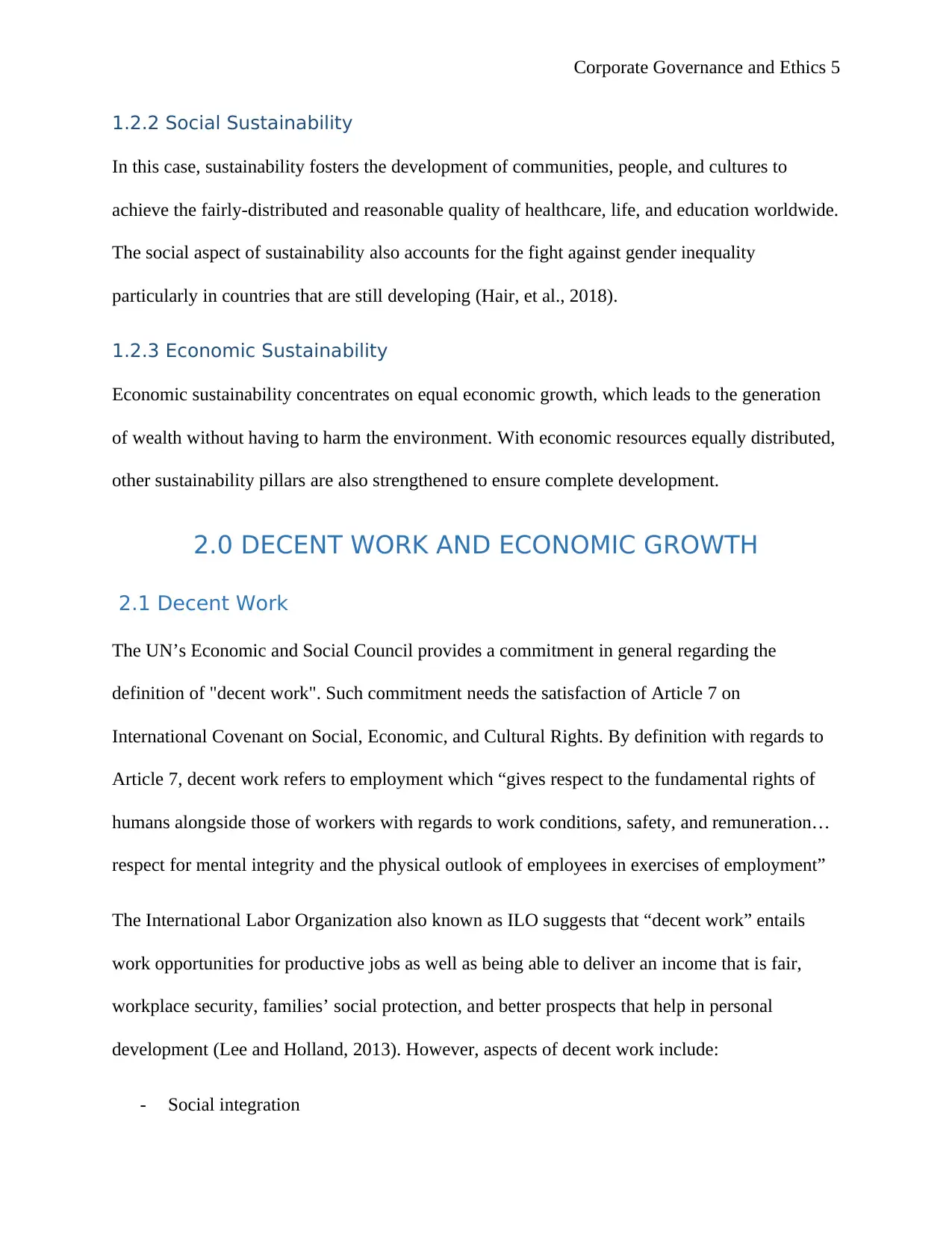
Corporate Governance and Ethics 5
1.2.2 Social Sustainability
In this case, sustainability fosters the development of communities, people, and cultures to
achieve the fairly-distributed and reasonable quality of healthcare, life, and education worldwide.
The social aspect of sustainability also accounts for the fight against gender inequality
particularly in countries that are still developing (Hair, et al., 2018).
1.2.3 Economic Sustainability
Economic sustainability concentrates on equal economic growth, which leads to the generation
of wealth without having to harm the environment. With economic resources equally distributed,
other sustainability pillars are also strengthened to ensure complete development.
2.0 DECENT WORK AND ECONOMIC GROWTH
2.1 Decent Work
The UN’s Economic and Social Council provides a commitment in general regarding the
definition of "decent work". Such commitment needs the satisfaction of Article 7 on
International Covenant on Social, Economic, and Cultural Rights. By definition with regards to
Article 7, decent work refers to employment which “gives respect to the fundamental rights of
humans alongside those of workers with regards to work conditions, safety, and remuneration…
respect for mental integrity and the physical outlook of employees in exercises of employment”
The International Labor Organization also known as ILO suggests that “decent work” entails
work opportunities for productive jobs as well as being able to deliver an income that is fair,
workplace security, families’ social protection, and better prospects that help in personal
development (Lee and Holland, 2013). However, aspects of decent work include:
- Social integration
1.2.2 Social Sustainability
In this case, sustainability fosters the development of communities, people, and cultures to
achieve the fairly-distributed and reasonable quality of healthcare, life, and education worldwide.
The social aspect of sustainability also accounts for the fight against gender inequality
particularly in countries that are still developing (Hair, et al., 2018).
1.2.3 Economic Sustainability
Economic sustainability concentrates on equal economic growth, which leads to the generation
of wealth without having to harm the environment. With economic resources equally distributed,
other sustainability pillars are also strengthened to ensure complete development.
2.0 DECENT WORK AND ECONOMIC GROWTH
2.1 Decent Work
The UN’s Economic and Social Council provides a commitment in general regarding the
definition of "decent work". Such commitment needs the satisfaction of Article 7 on
International Covenant on Social, Economic, and Cultural Rights. By definition with regards to
Article 7, decent work refers to employment which “gives respect to the fundamental rights of
humans alongside those of workers with regards to work conditions, safety, and remuneration…
respect for mental integrity and the physical outlook of employees in exercises of employment”
The International Labor Organization also known as ILO suggests that “decent work” entails
work opportunities for productive jobs as well as being able to deliver an income that is fair,
workplace security, families’ social protection, and better prospects that help in personal
development (Lee and Holland, 2013). However, aspects of decent work include:
- Social integration
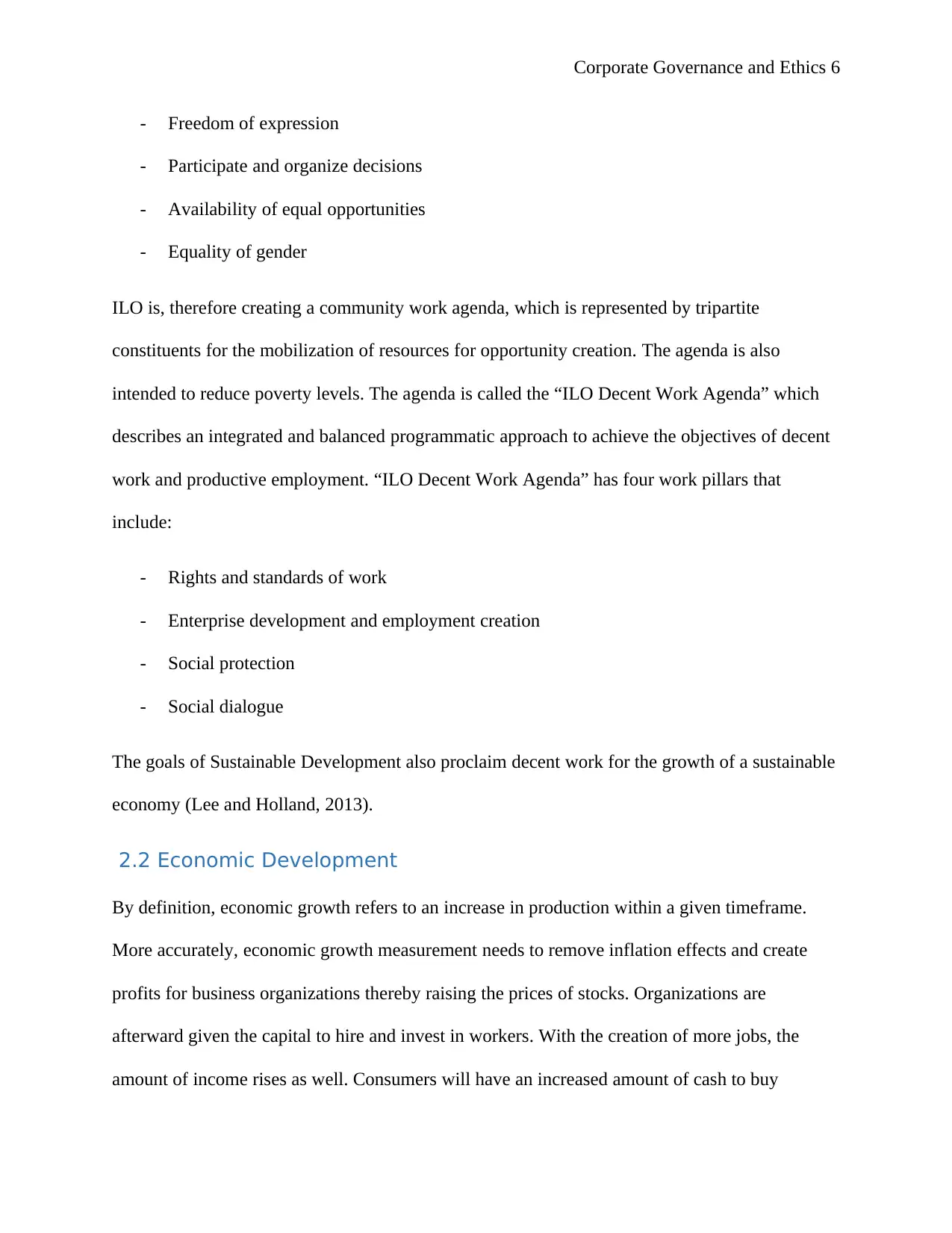
Corporate Governance and Ethics 6
- Freedom of expression
- Participate and organize decisions
- Availability of equal opportunities
- Equality of gender
ILO is, therefore creating a community work agenda, which is represented by tripartite
constituents for the mobilization of resources for opportunity creation. The agenda is also
intended to reduce poverty levels. The agenda is called the “ILO Decent Work Agenda” which
describes an integrated and balanced programmatic approach to achieve the objectives of decent
work and productive employment. “ILO Decent Work Agenda” has four work pillars that
include:
- Rights and standards of work
- Enterprise development and employment creation
- Social protection
- Social dialogue
The goals of Sustainable Development also proclaim decent work for the growth of a sustainable
economy (Lee and Holland, 2013).
2.2 Economic Development
By definition, economic growth refers to an increase in production within a given timeframe.
More accurately, economic growth measurement needs to remove inflation effects and create
profits for business organizations thereby raising the prices of stocks. Organizations are
afterward given the capital to hire and invest in workers. With the creation of more jobs, the
amount of income rises as well. Consumers will have an increased amount of cash to buy
- Freedom of expression
- Participate and organize decisions
- Availability of equal opportunities
- Equality of gender
ILO is, therefore creating a community work agenda, which is represented by tripartite
constituents for the mobilization of resources for opportunity creation. The agenda is also
intended to reduce poverty levels. The agenda is called the “ILO Decent Work Agenda” which
describes an integrated and balanced programmatic approach to achieve the objectives of decent
work and productive employment. “ILO Decent Work Agenda” has four work pillars that
include:
- Rights and standards of work
- Enterprise development and employment creation
- Social protection
- Social dialogue
The goals of Sustainable Development also proclaim decent work for the growth of a sustainable
economy (Lee and Holland, 2013).
2.2 Economic Development
By definition, economic growth refers to an increase in production within a given timeframe.
More accurately, economic growth measurement needs to remove inflation effects and create
profits for business organizations thereby raising the prices of stocks. Organizations are
afterward given the capital to hire and invest in workers. With the creation of more jobs, the
amount of income rises as well. Consumers will have an increased amount of cash to buy
⊘ This is a preview!⊘
Do you want full access?
Subscribe today to unlock all pages.

Trusted by 1+ million students worldwide
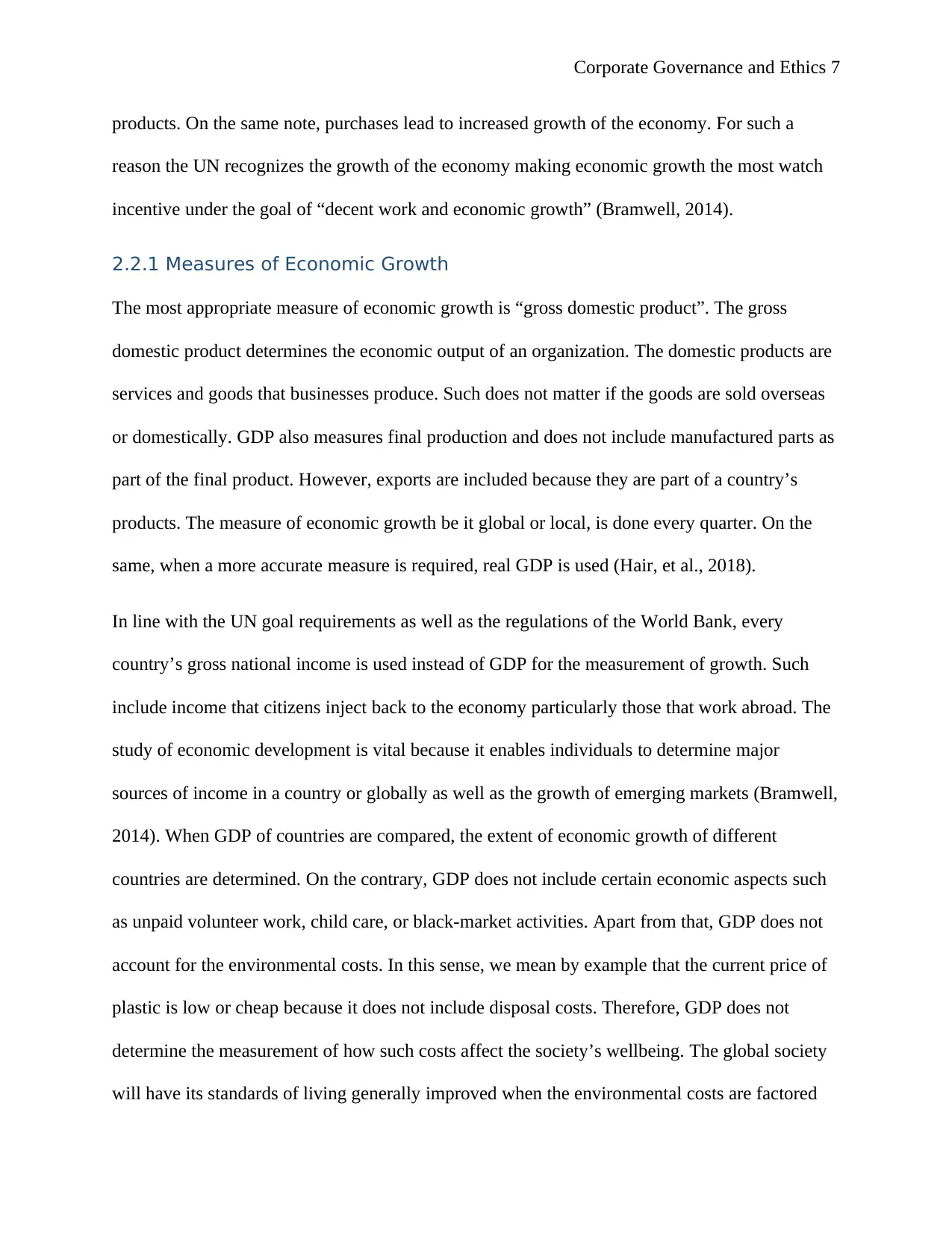
Corporate Governance and Ethics 7
products. On the same note, purchases lead to increased growth of the economy. For such a
reason the UN recognizes the growth of the economy making economic growth the most watch
incentive under the goal of “decent work and economic growth” (Bramwell, 2014).
2.2.1 Measures of Economic Growth
The most appropriate measure of economic growth is “gross domestic product”. The gross
domestic product determines the economic output of an organization. The domestic products are
services and goods that businesses produce. Such does not matter if the goods are sold overseas
or domestically. GDP also measures final production and does not include manufactured parts as
part of the final product. However, exports are included because they are part of a country’s
products. The measure of economic growth be it global or local, is done every quarter. On the
same, when a more accurate measure is required, real GDP is used (Hair, et al., 2018).
In line with the UN goal requirements as well as the regulations of the World Bank, every
country’s gross national income is used instead of GDP for the measurement of growth. Such
include income that citizens inject back to the economy particularly those that work abroad. The
study of economic development is vital because it enables individuals to determine major
sources of income in a country or globally as well as the growth of emerging markets (Bramwell,
2014). When GDP of countries are compared, the extent of economic growth of different
countries are determined. On the contrary, GDP does not include certain economic aspects such
as unpaid volunteer work, child care, or black-market activities. Apart from that, GDP does not
account for the environmental costs. In this sense, we mean by example that the current price of
plastic is low or cheap because it does not include disposal costs. Therefore, GDP does not
determine the measurement of how such costs affect the society’s wellbeing. The global society
will have its standards of living generally improved when the environmental costs are factored
products. On the same note, purchases lead to increased growth of the economy. For such a
reason the UN recognizes the growth of the economy making economic growth the most watch
incentive under the goal of “decent work and economic growth” (Bramwell, 2014).
2.2.1 Measures of Economic Growth
The most appropriate measure of economic growth is “gross domestic product”. The gross
domestic product determines the economic output of an organization. The domestic products are
services and goods that businesses produce. Such does not matter if the goods are sold overseas
or domestically. GDP also measures final production and does not include manufactured parts as
part of the final product. However, exports are included because they are part of a country’s
products. The measure of economic growth be it global or local, is done every quarter. On the
same, when a more accurate measure is required, real GDP is used (Hair, et al., 2018).
In line with the UN goal requirements as well as the regulations of the World Bank, every
country’s gross national income is used instead of GDP for the measurement of growth. Such
include income that citizens inject back to the economy particularly those that work abroad. The
study of economic development is vital because it enables individuals to determine major
sources of income in a country or globally as well as the growth of emerging markets (Bramwell,
2014). When GDP of countries are compared, the extent of economic growth of different
countries are determined. On the contrary, GDP does not include certain economic aspects such
as unpaid volunteer work, child care, or black-market activities. Apart from that, GDP does not
account for the environmental costs. In this sense, we mean by example that the current price of
plastic is low or cheap because it does not include disposal costs. Therefore, GDP does not
determine the measurement of how such costs affect the society’s wellbeing. The global society
will have its standards of living generally improved when the environmental costs are factored
Paraphrase This Document
Need a fresh take? Get an instant paraphrase of this document with our AI Paraphraser
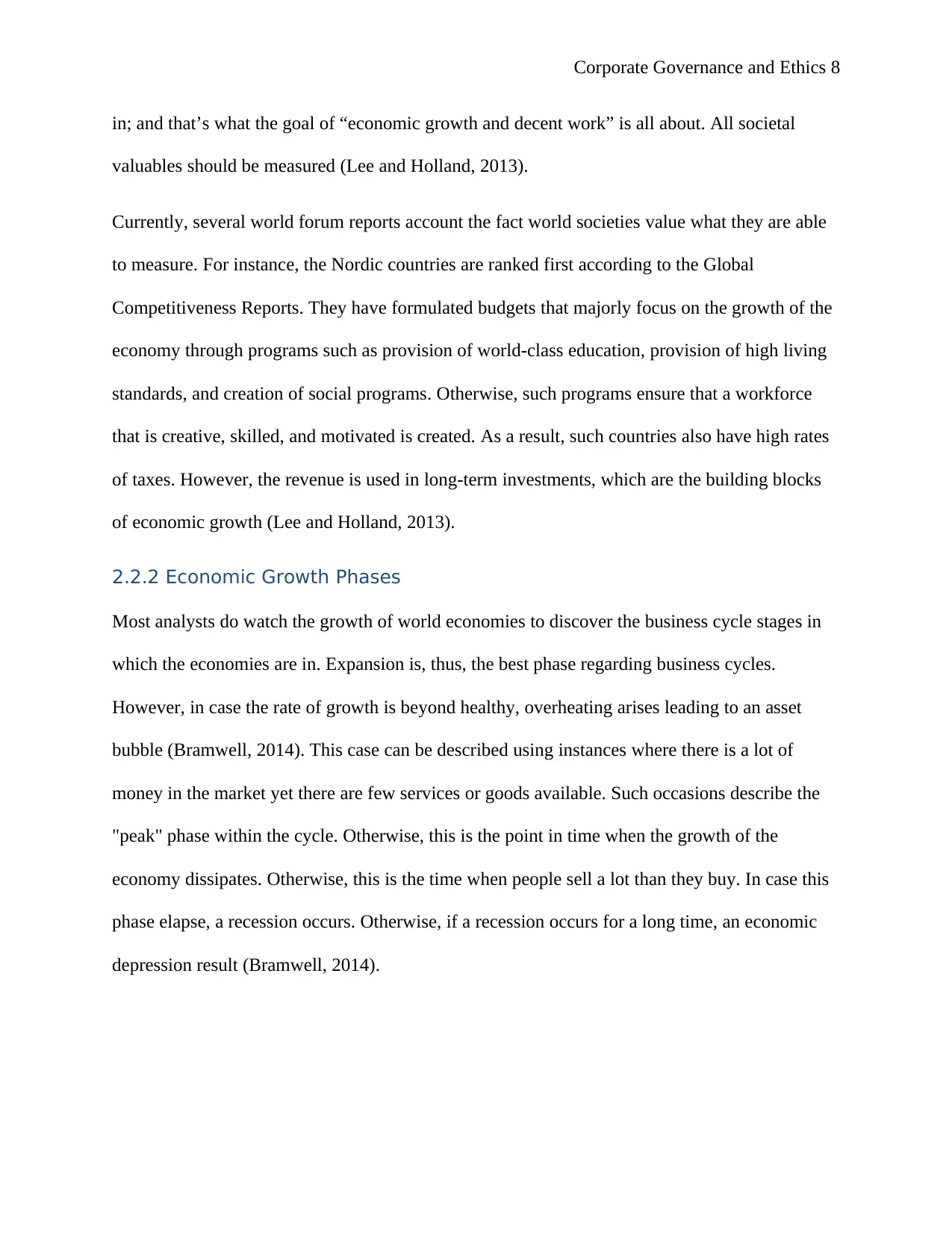
Corporate Governance and Ethics 8
in; and that’s what the goal of “economic growth and decent work” is all about. All societal
valuables should be measured (Lee and Holland, 2013).
Currently, several world forum reports account the fact world societies value what they are able
to measure. For instance, the Nordic countries are ranked first according to the Global
Competitiveness Reports. They have formulated budgets that majorly focus on the growth of the
economy through programs such as provision of world-class education, provision of high living
standards, and creation of social programs. Otherwise, such programs ensure that a workforce
that is creative, skilled, and motivated is created. As a result, such countries also have high rates
of taxes. However, the revenue is used in long-term investments, which are the building blocks
of economic growth (Lee and Holland, 2013).
2.2.2 Economic Growth Phases
Most analysts do watch the growth of world economies to discover the business cycle stages in
which the economies are in. Expansion is, thus, the best phase regarding business cycles.
However, in case the rate of growth is beyond healthy, overheating arises leading to an asset
bubble (Bramwell, 2014). This case can be described using instances where there is a lot of
money in the market yet there are few services or goods available. Such occasions describe the
"peak" phase within the cycle. Otherwise, this is the point in time when the growth of the
economy dissipates. Otherwise, this is the time when people sell a lot than they buy. In case this
phase elapse, a recession occurs. Otherwise, if a recession occurs for a long time, an economic
depression result (Bramwell, 2014).
in; and that’s what the goal of “economic growth and decent work” is all about. All societal
valuables should be measured (Lee and Holland, 2013).
Currently, several world forum reports account the fact world societies value what they are able
to measure. For instance, the Nordic countries are ranked first according to the Global
Competitiveness Reports. They have formulated budgets that majorly focus on the growth of the
economy through programs such as provision of world-class education, provision of high living
standards, and creation of social programs. Otherwise, such programs ensure that a workforce
that is creative, skilled, and motivated is created. As a result, such countries also have high rates
of taxes. However, the revenue is used in long-term investments, which are the building blocks
of economic growth (Lee and Holland, 2013).
2.2.2 Economic Growth Phases
Most analysts do watch the growth of world economies to discover the business cycle stages in
which the economies are in. Expansion is, thus, the best phase regarding business cycles.
However, in case the rate of growth is beyond healthy, overheating arises leading to an asset
bubble (Bramwell, 2014). This case can be described using instances where there is a lot of
money in the market yet there are few services or goods available. Such occasions describe the
"peak" phase within the cycle. Otherwise, this is the point in time when the growth of the
economy dissipates. Otherwise, this is the time when people sell a lot than they buy. In case this
phase elapse, a recession occurs. Otherwise, if a recession occurs for a long time, an economic
depression result (Bramwell, 2014).
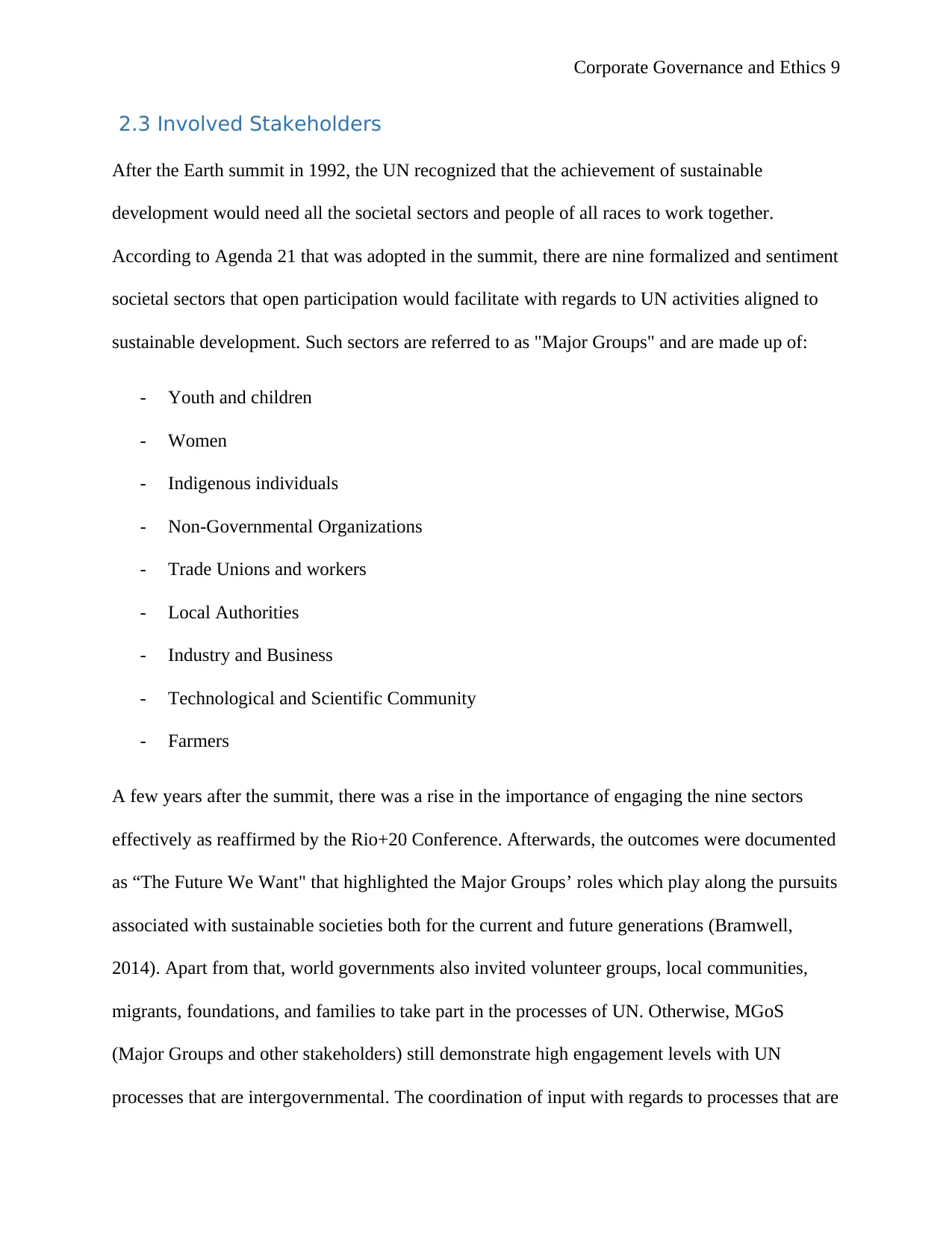
Corporate Governance and Ethics 9
2.3 Involved Stakeholders
After the Earth summit in 1992, the UN recognized that the achievement of sustainable
development would need all the societal sectors and people of all races to work together.
According to Agenda 21 that was adopted in the summit, there are nine formalized and sentiment
societal sectors that open participation would facilitate with regards to UN activities aligned to
sustainable development. Such sectors are referred to as "Major Groups" and are made up of:
- Youth and children
- Women
- Indigenous individuals
- Non-Governmental Organizations
- Trade Unions and workers
- Local Authorities
- Industry and Business
- Technological and Scientific Community
- Farmers
A few years after the summit, there was a rise in the importance of engaging the nine sectors
effectively as reaffirmed by the Rio+20 Conference. Afterwards, the outcomes were documented
as “The Future We Want" that highlighted the Major Groups’ roles which play along the pursuits
associated with sustainable societies both for the current and future generations (Bramwell,
2014). Apart from that, world governments also invited volunteer groups, local communities,
migrants, foundations, and families to take part in the processes of UN. Otherwise, MGoS
(Major Groups and other stakeholders) still demonstrate high engagement levels with UN
processes that are intergovernmental. The coordination of input with regards to processes that are
2.3 Involved Stakeholders
After the Earth summit in 1992, the UN recognized that the achievement of sustainable
development would need all the societal sectors and people of all races to work together.
According to Agenda 21 that was adopted in the summit, there are nine formalized and sentiment
societal sectors that open participation would facilitate with regards to UN activities aligned to
sustainable development. Such sectors are referred to as "Major Groups" and are made up of:
- Youth and children
- Women
- Indigenous individuals
- Non-Governmental Organizations
- Trade Unions and workers
- Local Authorities
- Industry and Business
- Technological and Scientific Community
- Farmers
A few years after the summit, there was a rise in the importance of engaging the nine sectors
effectively as reaffirmed by the Rio+20 Conference. Afterwards, the outcomes were documented
as “The Future We Want" that highlighted the Major Groups’ roles which play along the pursuits
associated with sustainable societies both for the current and future generations (Bramwell,
2014). Apart from that, world governments also invited volunteer groups, local communities,
migrants, foundations, and families to take part in the processes of UN. Otherwise, MGoS
(Major Groups and other stakeholders) still demonstrate high engagement levels with UN
processes that are intergovernmental. The coordination of input with regards to processes that are
⊘ This is a preview!⊘
Do you want full access?
Subscribe today to unlock all pages.

Trusted by 1+ million students worldwide
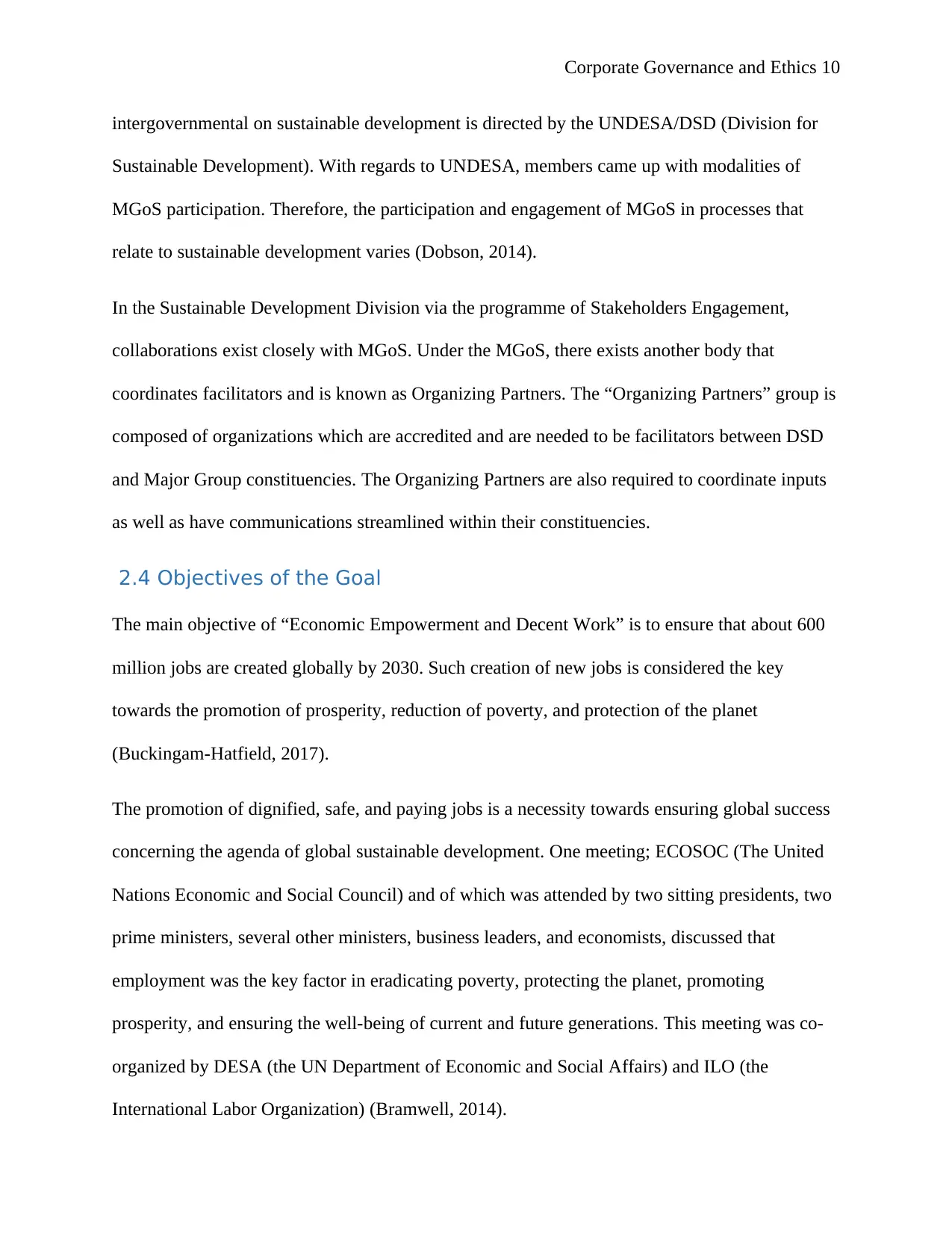
Corporate Governance and Ethics 10
intergovernmental on sustainable development is directed by the UNDESA/DSD (Division for
Sustainable Development). With regards to UNDESA, members came up with modalities of
MGoS participation. Therefore, the participation and engagement of MGoS in processes that
relate to sustainable development varies (Dobson, 2014).
In the Sustainable Development Division via the programme of Stakeholders Engagement,
collaborations exist closely with MGoS. Under the MGoS, there exists another body that
coordinates facilitators and is known as Organizing Partners. The “Organizing Partners” group is
composed of organizations which are accredited and are needed to be facilitators between DSD
and Major Group constituencies. The Organizing Partners are also required to coordinate inputs
as well as have communications streamlined within their constituencies.
2.4 Objectives of the Goal
The main objective of “Economic Empowerment and Decent Work” is to ensure that about 600
million jobs are created globally by 2030. Such creation of new jobs is considered the key
towards the promotion of prosperity, reduction of poverty, and protection of the planet
(Buckingam-Hatfield, 2017).
The promotion of dignified, safe, and paying jobs is a necessity towards ensuring global success
concerning the agenda of global sustainable development. One meeting; ECOSOC (The United
Nations Economic and Social Council) and of which was attended by two sitting presidents, two
prime ministers, several other ministers, business leaders, and economists, discussed that
employment was the key factor in eradicating poverty, protecting the planet, promoting
prosperity, and ensuring the well-being of current and future generations. This meeting was co-
organized by DESA (the UN Department of Economic and Social Affairs) and ILO (the
International Labor Organization) (Bramwell, 2014).
intergovernmental on sustainable development is directed by the UNDESA/DSD (Division for
Sustainable Development). With regards to UNDESA, members came up with modalities of
MGoS participation. Therefore, the participation and engagement of MGoS in processes that
relate to sustainable development varies (Dobson, 2014).
In the Sustainable Development Division via the programme of Stakeholders Engagement,
collaborations exist closely with MGoS. Under the MGoS, there exists another body that
coordinates facilitators and is known as Organizing Partners. The “Organizing Partners” group is
composed of organizations which are accredited and are needed to be facilitators between DSD
and Major Group constituencies. The Organizing Partners are also required to coordinate inputs
as well as have communications streamlined within their constituencies.
2.4 Objectives of the Goal
The main objective of “Economic Empowerment and Decent Work” is to ensure that about 600
million jobs are created globally by 2030. Such creation of new jobs is considered the key
towards the promotion of prosperity, reduction of poverty, and protection of the planet
(Buckingam-Hatfield, 2017).
The promotion of dignified, safe, and paying jobs is a necessity towards ensuring global success
concerning the agenda of global sustainable development. One meeting; ECOSOC (The United
Nations Economic and Social Council) and of which was attended by two sitting presidents, two
prime ministers, several other ministers, business leaders, and economists, discussed that
employment was the key factor in eradicating poverty, protecting the planet, promoting
prosperity, and ensuring the well-being of current and future generations. This meeting was co-
organized by DESA (the UN Department of Economic and Social Affairs) and ILO (the
International Labor Organization) (Bramwell, 2014).
Paraphrase This Document
Need a fresh take? Get an instant paraphrase of this document with our AI Paraphraser
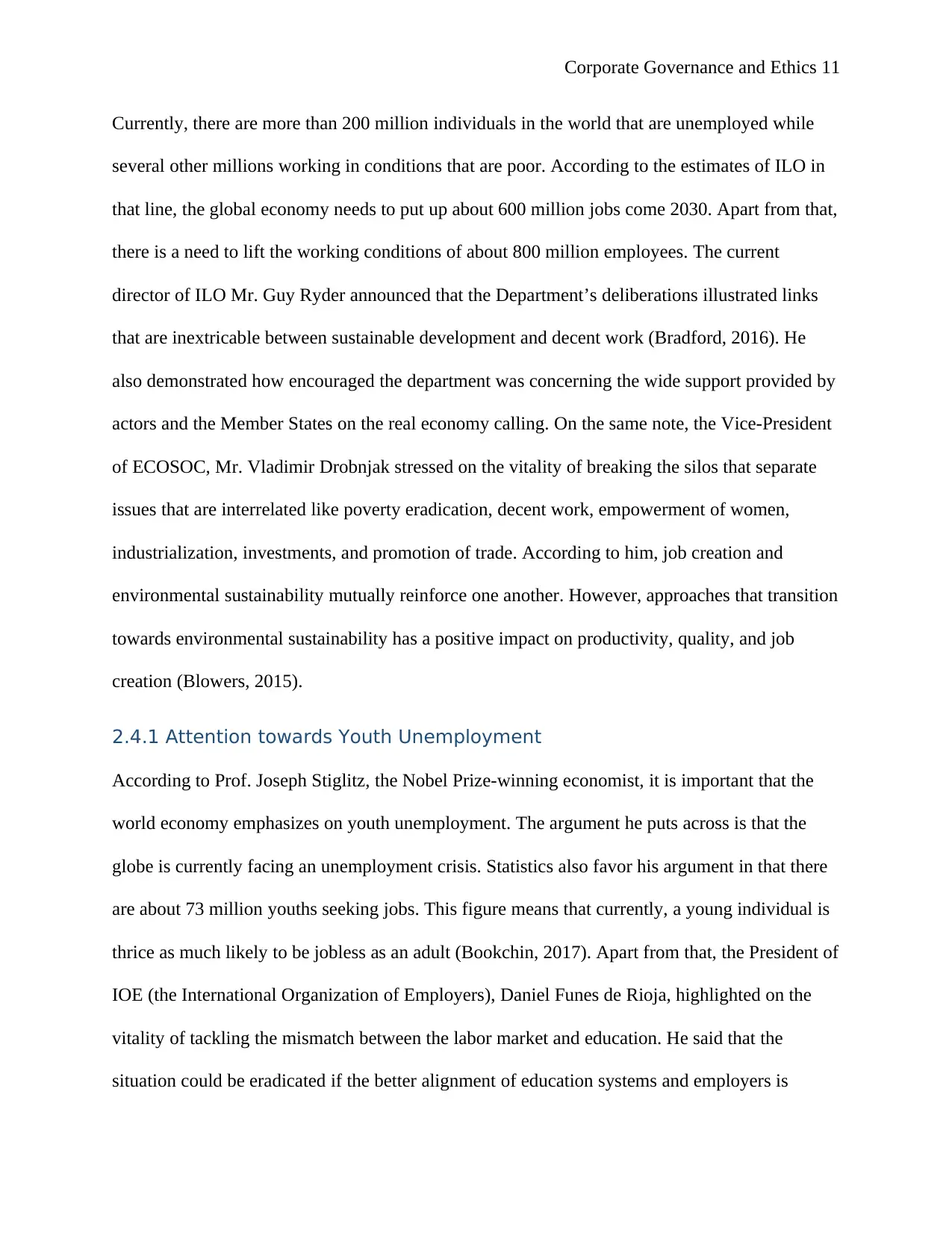
Corporate Governance and Ethics 11
Currently, there are more than 200 million individuals in the world that are unemployed while
several other millions working in conditions that are poor. According to the estimates of ILO in
that line, the global economy needs to put up about 600 million jobs come 2030. Apart from that,
there is a need to lift the working conditions of about 800 million employees. The current
director of ILO Mr. Guy Ryder announced that the Department’s deliberations illustrated links
that are inextricable between sustainable development and decent work (Bradford, 2016). He
also demonstrated how encouraged the department was concerning the wide support provided by
actors and the Member States on the real economy calling. On the same note, the Vice-President
of ECOSOC, Mr. Vladimir Drobnjak stressed on the vitality of breaking the silos that separate
issues that are interrelated like poverty eradication, decent work, empowerment of women,
industrialization, investments, and promotion of trade. According to him, job creation and
environmental sustainability mutually reinforce one another. However, approaches that transition
towards environmental sustainability has a positive impact on productivity, quality, and job
creation (Blowers, 2015).
2.4.1 Attention towards Youth Unemployment
According to Prof. Joseph Stiglitz, the Nobel Prize-winning economist, it is important that the
world economy emphasizes on youth unemployment. The argument he puts across is that the
globe is currently facing an unemployment crisis. Statistics also favor his argument in that there
are about 73 million youths seeking jobs. This figure means that currently, a young individual is
thrice as much likely to be jobless as an adult (Bookchin, 2017). Apart from that, the President of
IOE (the International Organization of Employers), Daniel Funes de Rioja, highlighted on the
vitality of tackling the mismatch between the labor market and education. He said that the
situation could be eradicated if the better alignment of education systems and employers is
Currently, there are more than 200 million individuals in the world that are unemployed while
several other millions working in conditions that are poor. According to the estimates of ILO in
that line, the global economy needs to put up about 600 million jobs come 2030. Apart from that,
there is a need to lift the working conditions of about 800 million employees. The current
director of ILO Mr. Guy Ryder announced that the Department’s deliberations illustrated links
that are inextricable between sustainable development and decent work (Bradford, 2016). He
also demonstrated how encouraged the department was concerning the wide support provided by
actors and the Member States on the real economy calling. On the same note, the Vice-President
of ECOSOC, Mr. Vladimir Drobnjak stressed on the vitality of breaking the silos that separate
issues that are interrelated like poverty eradication, decent work, empowerment of women,
industrialization, investments, and promotion of trade. According to him, job creation and
environmental sustainability mutually reinforce one another. However, approaches that transition
towards environmental sustainability has a positive impact on productivity, quality, and job
creation (Blowers, 2015).
2.4.1 Attention towards Youth Unemployment
According to Prof. Joseph Stiglitz, the Nobel Prize-winning economist, it is important that the
world economy emphasizes on youth unemployment. The argument he puts across is that the
globe is currently facing an unemployment crisis. Statistics also favor his argument in that there
are about 73 million youths seeking jobs. This figure means that currently, a young individual is
thrice as much likely to be jobless as an adult (Bookchin, 2017). Apart from that, the President of
IOE (the International Organization of Employers), Daniel Funes de Rioja, highlighted on the
vitality of tackling the mismatch between the labor market and education. He said that the
situation could be eradicated if the better alignment of education systems and employers is
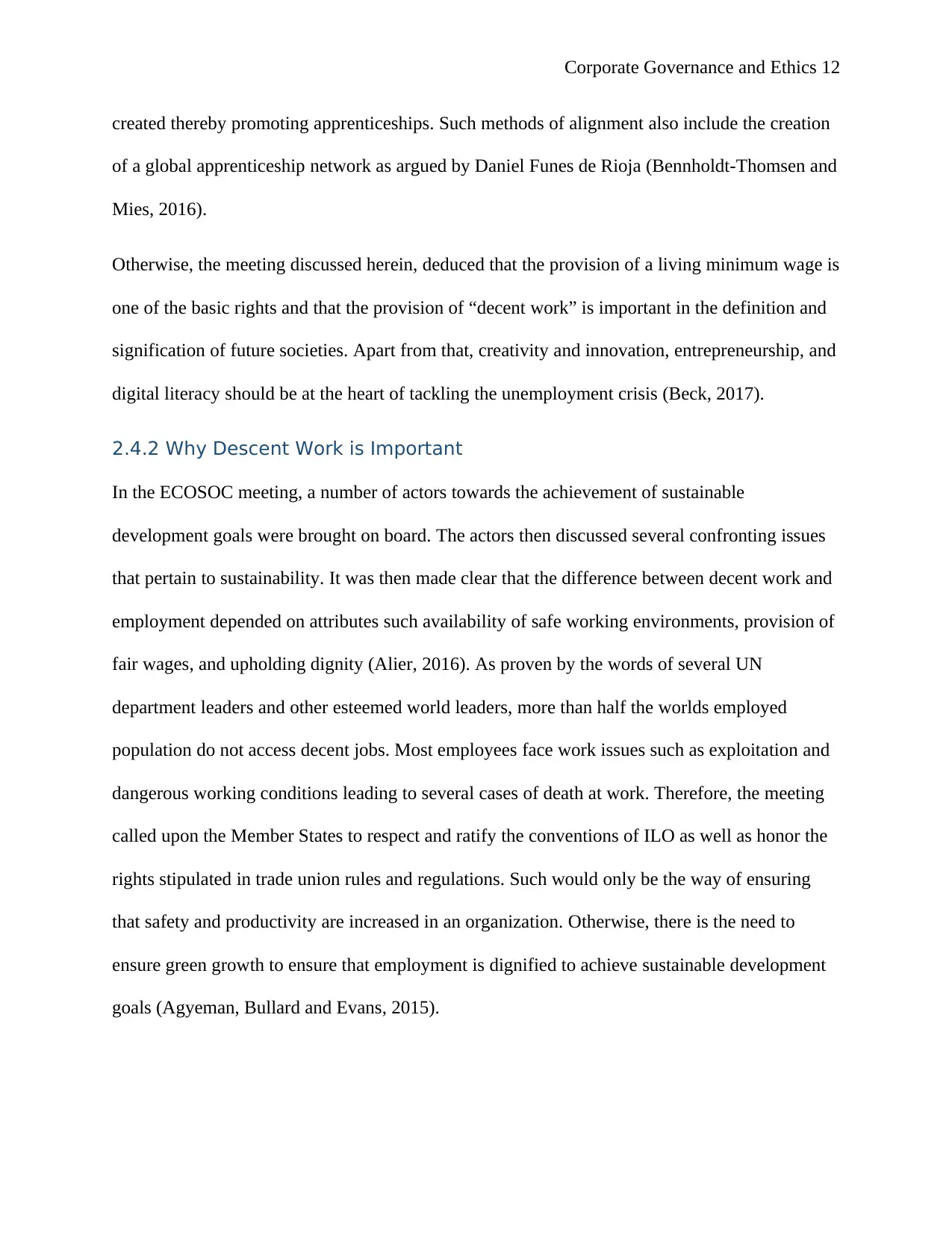
Corporate Governance and Ethics 12
created thereby promoting apprenticeships. Such methods of alignment also include the creation
of a global apprenticeship network as argued by Daniel Funes de Rioja (Bennholdt-Thomsen and
Mies, 2016).
Otherwise, the meeting discussed herein, deduced that the provision of a living minimum wage is
one of the basic rights and that the provision of “decent work” is important in the definition and
signification of future societies. Apart from that, creativity and innovation, entrepreneurship, and
digital literacy should be at the heart of tackling the unemployment crisis (Beck, 2017).
2.4.2 Why Descent Work is Important
In the ECOSOC meeting, a number of actors towards the achievement of sustainable
development goals were brought on board. The actors then discussed several confronting issues
that pertain to sustainability. It was then made clear that the difference between decent work and
employment depended on attributes such availability of safe working environments, provision of
fair wages, and upholding dignity (Alier, 2016). As proven by the words of several UN
department leaders and other esteemed world leaders, more than half the worlds employed
population do not access decent jobs. Most employees face work issues such as exploitation and
dangerous working conditions leading to several cases of death at work. Therefore, the meeting
called upon the Member States to respect and ratify the conventions of ILO as well as honor the
rights stipulated in trade union rules and regulations. Such would only be the way of ensuring
that safety and productivity are increased in an organization. Otherwise, there is the need to
ensure green growth to ensure that employment is dignified to achieve sustainable development
goals (Agyeman, Bullard and Evans, 2015).
created thereby promoting apprenticeships. Such methods of alignment also include the creation
of a global apprenticeship network as argued by Daniel Funes de Rioja (Bennholdt-Thomsen and
Mies, 2016).
Otherwise, the meeting discussed herein, deduced that the provision of a living minimum wage is
one of the basic rights and that the provision of “decent work” is important in the definition and
signification of future societies. Apart from that, creativity and innovation, entrepreneurship, and
digital literacy should be at the heart of tackling the unemployment crisis (Beck, 2017).
2.4.2 Why Descent Work is Important
In the ECOSOC meeting, a number of actors towards the achievement of sustainable
development goals were brought on board. The actors then discussed several confronting issues
that pertain to sustainability. It was then made clear that the difference between decent work and
employment depended on attributes such availability of safe working environments, provision of
fair wages, and upholding dignity (Alier, 2016). As proven by the words of several UN
department leaders and other esteemed world leaders, more than half the worlds employed
population do not access decent jobs. Most employees face work issues such as exploitation and
dangerous working conditions leading to several cases of death at work. Therefore, the meeting
called upon the Member States to respect and ratify the conventions of ILO as well as honor the
rights stipulated in trade union rules and regulations. Such would only be the way of ensuring
that safety and productivity are increased in an organization. Otherwise, there is the need to
ensure green growth to ensure that employment is dignified to achieve sustainable development
goals (Agyeman, Bullard and Evans, 2015).
⊘ This is a preview!⊘
Do you want full access?
Subscribe today to unlock all pages.

Trusted by 1+ million students worldwide
1 out of 14
Related Documents
Your All-in-One AI-Powered Toolkit for Academic Success.
+13062052269
info@desklib.com
Available 24*7 on WhatsApp / Email
![[object Object]](/_next/static/media/star-bottom.7253800d.svg)
Unlock your academic potential
Copyright © 2020–2026 A2Z Services. All Rights Reserved. Developed and managed by ZUCOL.





